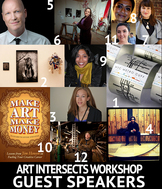
I wanted to share, in the form of bullet points, some of the topics that were addressed and to highlight the universality of certain themes that seem to come up in many discussions among artists.
The portion on Creative Blocks addressed:
- blocks as a force of resistance which, though normal and frequently occurring, can become a great problem when the artist remains in the "low motivation" phase for too long or when deadlines, pressure to sell and turn work in becomes overwhelming.
- blocks as filters with which artists view what the work or the creative process should look like. For example, "I have to have complete silence during the creative process" or "the work needs to pay the bills" and so on.
- the need to adopt new thinking patterns and innovative ways of doing things in order to manage and overcome blocks. Creative individuals, already being at an advantage due to their creative nature, will hopefully be able to use their flexibility in thinking and perceiving as useful tools to change behaviors and thoughts which contribute to creative blocks.
- the importance of understanding different types of blocks before attempting to overcome them. For example, is my block related to the way I think about myself, related to past experiences, to the meaning and value I assign to my product, my environment which is not conducive to creativity?
- Steps such as 1) developing an inner dialogue to respond to negative thoughts 2) visualizing desired goals 3) acknowledging fears or anxieties and practicing relaxation or mindfulness 4) taking actionable small steps towards new goals etc.
One of the themes that often comes up in discussions among artists is the motivation or meaning attached to the creative process and the work. In particular, the search for what art means to each person can be a bumpy road. It may start off as a form of venting, self-expression, facilitate identity search, become a way of connecting to others and eventually turn into a means to paying the bills; a product to be sold. This shift can create somewhat of a cognitive dissonance and create unsettling feelings about the subjective value and use of art.
It is important to explore how each artist feels about making the shift from "art for me" into "art for money" and what this may bring up. For some, it may be a forbidden path which leads to the artist keeping their "day job" as a source of income in order to have complete freedom in their art. For others, it may simply mean establishing boundaries about what compromises the artist is willing to make in order to make money from art. For others, it may be about compartmentalizing their art pursuits in different categories, i.e "this art is for art's sake, whereas this art is there to achieve another goal, and I'm aware and fully ok with this distinction."
Either way, having open discussions that facilitate sharing these concerns, blocks, dreams and goals is an extremely vital part of becoming successful - whatever one's definition of success may be!
 RSS Feed
RSS Feed
